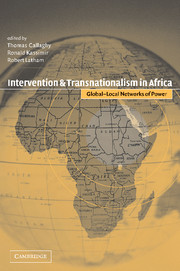Book contents
- Frontmatter
- Contents
- List of contributors
- Preface
- List of abbreviations
- 1 Introduction: transboundary formations, intervention, order, and authority
- Part I Historical dimensions and intellectual context
- Part II Theoretical frameworks
- Part III Transboundary networks, international institutions, states, and civil societies
- Part IV Political economies of violence and authority
- 9 How sovereignty matters: international markets and the political economy of local politics in weak states
- 10 Out of the shadows
- 11 New sovereigns? Regulatory authority in the Chad Basin
- Part V Conclusion
- References
- Index
9 - How sovereignty matters: international markets and the political economy of local politics in weak states
Published online by Cambridge University Press: 18 December 2009
- Frontmatter
- Contents
- List of contributors
- Preface
- List of abbreviations
- 1 Introduction: transboundary formations, intervention, order, and authority
- Part I Historical dimensions and intellectual context
- Part II Theoretical frameworks
- Part III Transboundary networks, international institutions, states, and civil societies
- Part IV Political economies of violence and authority
- 9 How sovereignty matters: international markets and the political economy of local politics in weak states
- 10 Out of the shadows
- 11 New sovereigns? Regulatory authority in the Chad Basin
- Part V Conclusion
- References
- Index
Summary
Where do local power and authority lie in Africa when formal bureaucratic state institutions are either very weak or non-existent? At first glance, it seems that in Africa's worst-off states, places such as Nigeria, Congo, Liberia, and Sierra Leone, rulers cannot control associates, much less shape societies and economies within their borders. “Some states,” writes Christopher Clapham (1996: 273), “have been so thoroughly privatized as to differ little from territories controlled by warlords.” In Nigeria, for example, private groups even collect taxes, generating complaints that state officials ally with armed brigands to extort money from citizens for purely private gain (Olarewaju 1998: 16). Misrule and politicians' failure to satisfy even minimal popular expectations can lead to the collapse of order. Internal sovereignty in parts of Africa, argues Robert Jackson (1993), in the sense of a capacity even to preside over regime associates, much less control a specific territory, is increasingly either very weak or non-existent.
Jackson explains this weakening of internal control as being related to the growing unwillingness among officials in non-African states to give material assistance to help rulers compensate for weak bureaucracies. Proliferating insurgencies and the outright collapse of state order in Liberia, Somalia, Congo, and intermittently in Sierra Leone and Congo-Brazzaville appear to indicate a significant decline in external resources and internal capabilities available to rulers of weak states. This internal weakness calls into question the capacity of rulers to benefit from juridical, or external, recognition of nominal sovereignty.
- Type
- Chapter
- Information
- Intervention and Transnationalism in AfricaGlobal-Local Networks of Power, pp. 197 - 215Publisher: Cambridge University PressPrint publication year: 2001
- 49
- Cited by



